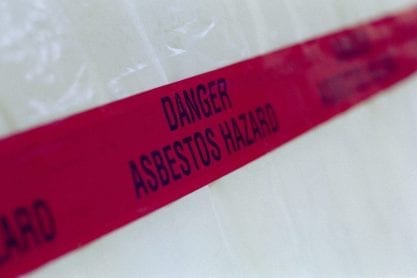Malignant mesothelioma is a fatal type of cancer caused by exposure to asbestos, a mineral that was widely used in construction and manufacturing throughout the twentieth century. The disease often begins with the inhalation or swallowing of asbestos dust particles, invisible to the naked eye, which can cause irritation in the lungs or other organs.

Over time, cancer begins to grow in the thin linings of the lungs, heart, chest, or abdomen.
Not everyone exposed to asbestos will develop the disease. Some people can have years of exposure to asbestos dust and never develop mesothelioma, while others can have very little exposure and later learn that they have the illness.
According to the U.S. Geological survey, asbestos use peaked in this country in 1973, at 803,000 metric tons. Despite increasingly strict exposure limits implemented since the early 1970s, many cases are only now coming to light because it takes 20 to 40 years after initial exposure for symptoms of mesothelioma to appear. Although asbestos is no longer mined in the United States, it is still being imported and used in construction and transportation products, according to the Environmental Protection Agency, so new cases will continue to arise even decades from now.
While the mortality rate from mesothelioma is relatively small compared to other causes of death – the Centers for Disease Control and Prevention has documented that fewer than 3,000 people die each year of the disease in the United States – the impact of the disease, and the lost lives, is immense.
Victims of the illness can suffer chest or abdominal pain, painful coughing, shortness of breath, swelling, lumps or masses, and weight loss. Their families often face massive medical expenses, and because most cases of mesothelioma are incurable, they are eventually robbed of their loved ones’ emotional and financial support.
Whether asbestos exposure is work-related, happens at home, or environmental, many mesothelioma victims are entitled to compensation. A settlement can help pay for necessary medical care, and in many cases, also delivers additional funds to help compensate for the pain and suffering associated with this devastating disease.
